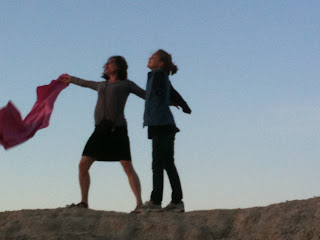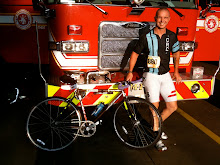Two posts below, I discuss how certain shifts develop a theme (people with shit everywhere; fat people in small cars; dead pets; off-my-meds crazy) that reveals itself only in course of our calls.
Another aspect of my job is that we respond to whatever we're called to, whenever it comes in. Today, we were doing a commercial building inspection on Lake Street, and the manager of the repair shop turned out to be a cyclist who'd just completed Ride the Rockies. He was telling me about his trip, we were commiserating about the hazards of cycling in general, and steep downhills (like the rockies) and distracted drivers (like anywhere, generally, and the two people who blew stop signs and nearly pegged me at two different intersections on my ride to work this morning, specifically). This wasn't much of an inspection: the public never goes beyond the service counter; the three workers have numerous exits at the rear; the building, if on fire in the night, would be prohibitively dangerous so we'd most likely stay outside and spray the burning machine metal.
We left and I was trying to call the man for our next inspection, as we were running early. Our rig cell phone is/was locked/frozen and I spent several minutes trying to fix it w/o banging off the street.
I was reaching for my personal phone but we caught a call that came in as difficulty breathing. We arrived at the nursing home and were met by the nurse-like people (don't presume everyone in sensible shoes knows much about medicine...) who were, unlike most calls to this place, quite agitated. One woman led us to the stairs at a speed sufficient for competitive stair climbing. In a small room, several staff were kneeling around a man who wasn't breathing. They were doing a form of CPR. We took over, and they continued to stand over/around us. Six staff around three firefighters, our equipment, and a lifeless man. In a small room. I had to actively encourage people to clear out. Still, several stood there for most of the thirty minutes we worked the man. The paramedics arrived, we continued to do CPR and breathe for him, but/though it was clear he wasn't coming back--no electrical energy in his body. As soon as I stopped compressions, everything went flat on the monitor. He up and died in his easy chair. The list of his medical conditions was several pages, so it's not unexpected.
After half and hour, the medics called it. We were all drenched in sweat. We cleared the mess from the attempt, lifted him from the floor to his bed (for his family's imminent arrival) and said bye to medics.
As we carried our gear and the medics' gear down the hall, we passed one of the nurse-like staff, who was sobbing quietly. Odd: this is a nursing home, where people go to die. Most of the time, we find residents dead in their chairs, having been overlooked for several hours. This man was old-enough and sick-enough that death wasn't a shocking turn-around. Of course, it's sweet to care and be saddened by a human's death, but from the nurse with paperwork, the man hadn't been in the place for more than a few months.
We continued to our next inspection, still dripping sweat. No time to decompress, process, or towel off. The caretaker of this apartment building looks like a non-famous Iggy Pop. Year of hard living, but he's still ticking. His body emits enough second-hand smoke to clog a room, but he's a colorful odd-job.
And so we went, doing our stuff, going places for things and people. We don't know what we'll get; we respond and adapt and adjust as we must.
5 years ago































